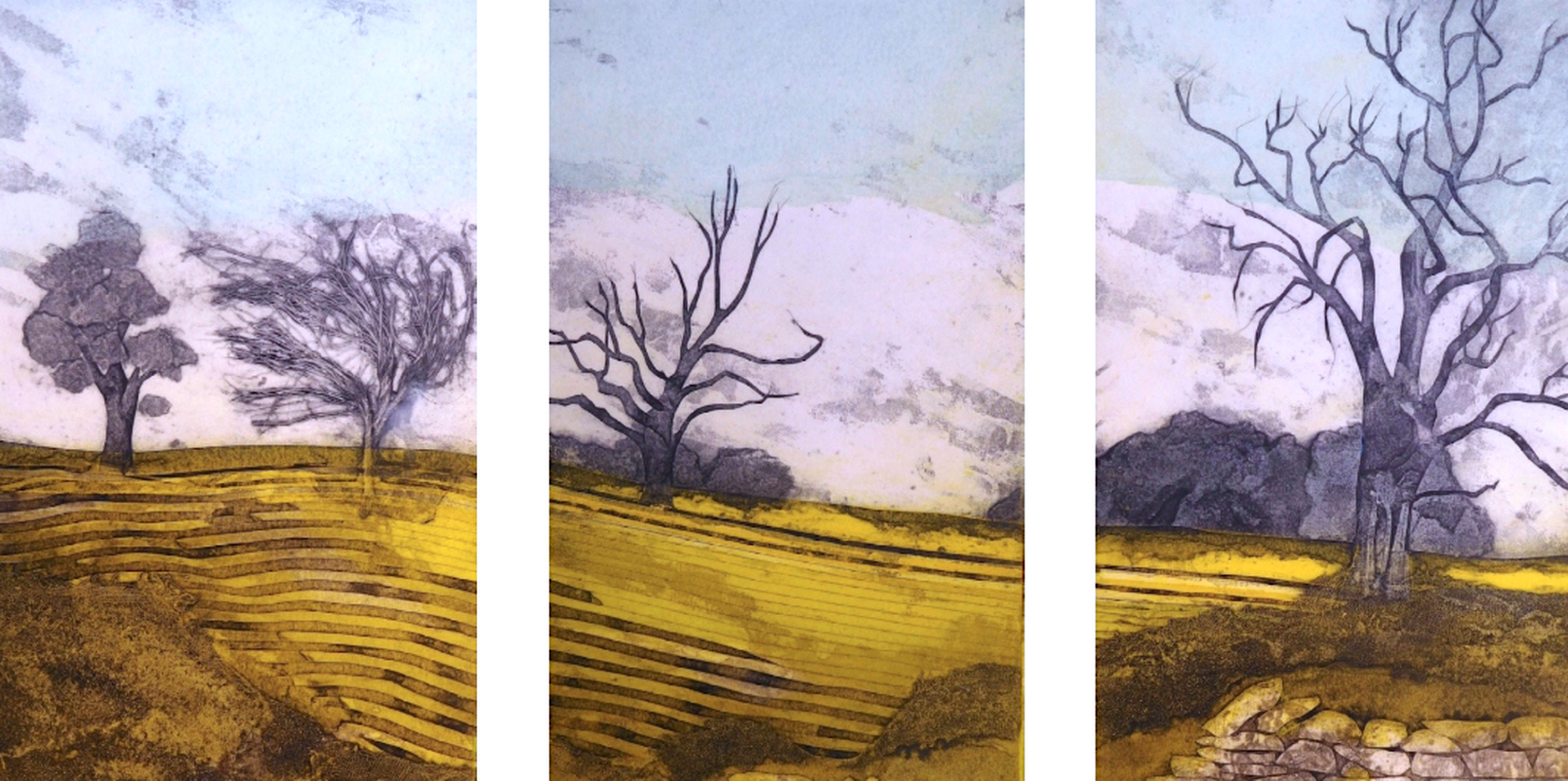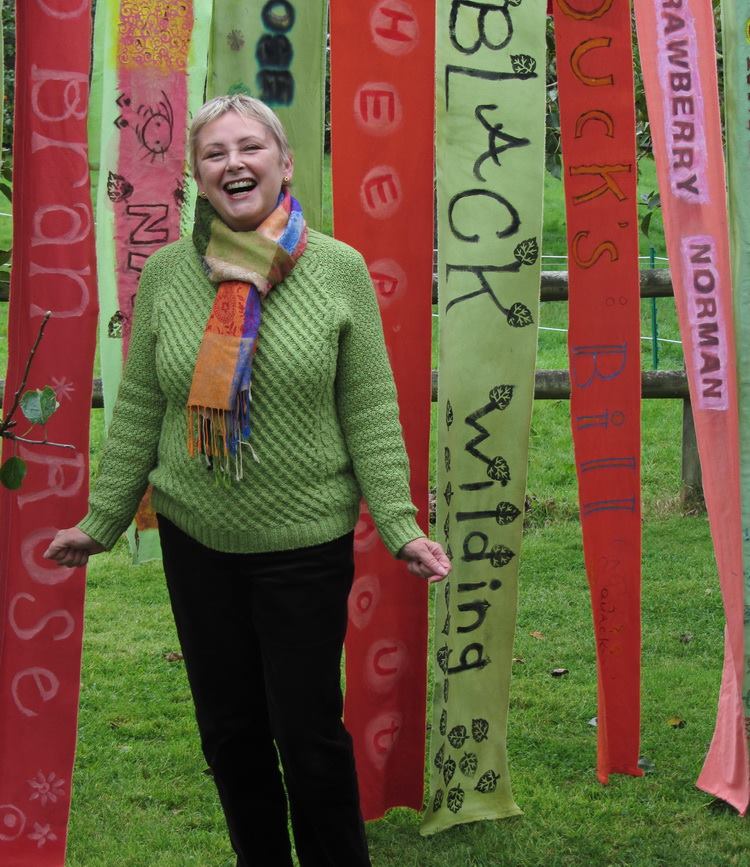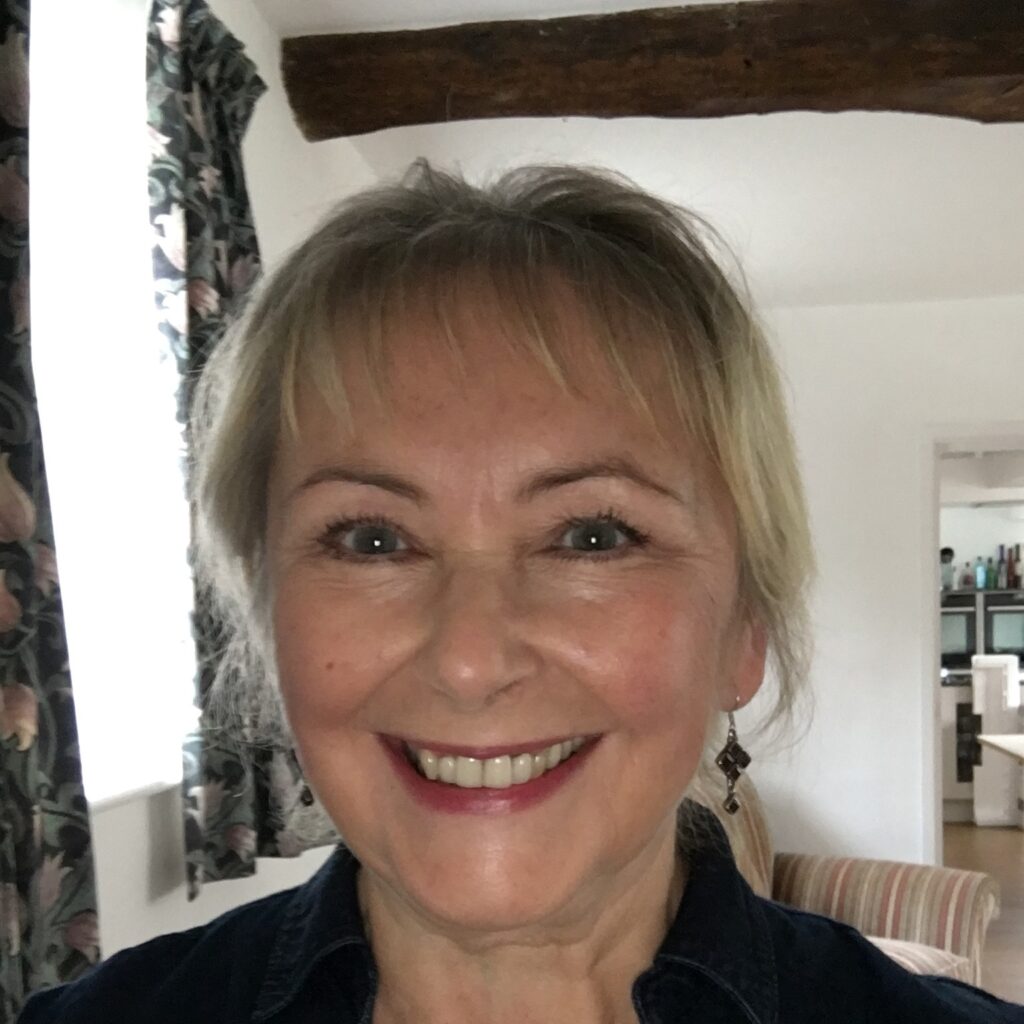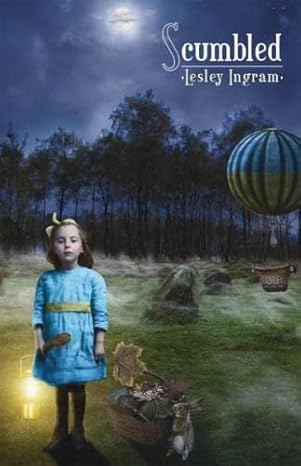
SARAH ROSS-THOMPSON AND THE ART OF COLLAGRAPHED PRINTS
I interviewed artist Sarah Ross-Thompson whose exceptional Collagraphed prints use fabrics, lichen, porridge and string to create images of the dramatic Scottish Highlands where she


I interviewed poet Lesley Ingram, winner of the 2020 Stanza Poetry Competition. Lesley has a Masters in Creative Writing with ‘Ekphrasis as Translation’ as her thesis, which gave rise to her first collection, Scumbled (Cinnamon). Lesley, who is a member of Hereabouts Poets, has read at poetry festivals in Cheltenham, Wenlock and Ledbury (where she now lives).
Leslie: Tell us about the Ledbury Poetry Festival – the highs, the lows, the stories behind it. Can you give us a sense of what’s remarkable about the festival’s venues and history?
Lesley: I’m a relative newcomer to Ledbury, so my knowledge of highs and lows is limited I’m afraid. There are so many high points, which of course, are rather personal. But Naomi Sahib-Nye was undeniably a star as Poet in Residence a few years ago. She worked so hard at attending and supporting practically every event, was warm and personable, and could give a masterclass in how to be a Poet-in-Residence. The low point was when a guest headliner was late arriving, and the Community Hall, packed with about 200 people waited and waited. When the guest was eventually tracked down via phone, she admitted to having forgotten all about it, so all the attendees had to be refunded and left disappointed.
It began, I believe in 1997, making this year’s festival its 27th year. It does not have an academic/city/publisher foundation, but is driven by poetry lovers who live in the countryside, giving it a rural base and fresh-air atmosphere, for and by those with a love of poetry, and engaging with local businesses and people.
The staff and trustees do not only produce a festival. They work all year round bringing poetry to communities and schools, working in partnership with other arts organisations such as Creative Pathways, connecting with international poetry initiatives like Versopolis.
They are now to be found in the Elizabeth Barrett Browning building, under the clocktower on the Homend/High St crossroads, which has been renamed The Poetry House. Plans are afoot to make it a true poetry hub, and it should be brilliant, given the time and money it will take to achieve this.
Leslie: What projects and experiences have the Hereabouts Poets brought to the Ledbury Festival? Which one is your favourite and why?
Lesley: We have had five events as a group so far, excluding the readings given at Festival Volunteers’ Christmas parties.
They are:
We are the HereAbouts Poets because members belong to Herefordshire, Worcestershire and Gloucestershire, so come from here and hereabouts. We have produced pamphlets /booklets for all the projects excepting John Masefield, which was recorded by Ledbury Poetry Festival.
My favourite was the very first we did, as we walked round town reading our poems in front of Ledbury’s old Alleys and Yards. We had dozens of people with us and had to stop the traffic so that we could all cross at one point. It was fun, and the poems were great, being focussed on the town itself.
Leslie: Tell us about your studies of ekphrastic poetry and about what went into your first collection ‘Scumbled’. How does the collection’s title fit your writing?

Lesley: ‘Scumbled’ came out of my Masters dissertation ‘Ekphrasis as Translation’, in which I attempted to translate the images of digital artist Maggie Taylor into poems by taking meanings from them and building characters and stories for the poems.
I researched and applied traditional symbols in art, then created connections between the images, using for example, the repeated motif of a red glove to develop a story between them, as I did with those images of two people in a portrait pose which I took to be same people at different times of their lives. The images are surreal in many cases, and some appear in of pairs male and female versions like Optimist’s Dress & Optimist’s Suit and The Burden of Dreams (female) The Burden of Dreams (male).
There are scores of digital layers and masks and other Photoshop techniques in each image, and the extra layer of the computer screen between me and the images creates more distance and lack of clarity and definition, rather like the effect that a scumble glaze could have over an image which changes the visual colour combination or crackles the image thereby blurring it.
Translators cannot help but leave a little of themselves in every translation, so Scumbled says quite a lot about me too, in my interpretation and translation. I thoroughly enjoyed writing this book, it was so satisfying.
Leslie: How do you ensure you give your best to each poem you write? What’s the process from first spark to finished piece?
Lesley: I always write my best poems in my head in the middle of the night, in bed when I can’t sleep. Then in the morning, I have forgotten them. Many poets do this I’ve heard, and it is so frustrating.
Otherwise, I hear a comment, or remember something, or have a theme on the go. Although I make little notes when out and about, I rarely write a poem by hand. I use Word and build the poem almost line by line, editing as I go along but pushing the discarded bits and pieces down the page, just in case I want to use them elsewhere or recognise that the first thought works better and bring it back. Then when the first draft is set down and I’m happy with it, I leave it alone to drain for at least a week, sometimes much longer, then come back to it fresh like a new reader, which allows me to see oddities, errors, superfluous lines, which bits don’t work as well as they should, and of course, whether it starts and ends in the right place.
I rarely write a poem from beginning to end at one time, though it has been known. During Covid, for example, I was interested by the concept of being protected by an absence, and that poem came along all at once.
Leslie: What did you learn from your PhD in Yorkshire Dialect poetry? How has it affected your writing and appreciation of other people’s writing?
Lesley: I started but didn’t finish.
Although what I wanted to do – and still would love to – is to write a book of contemporary poems in dialect without the cliches of flat caps and whippets, but imbibe the poems with sounds and vocabulary of Yorkshire as part of a ‘standard’, i.e. not making the Yorkshire Dialect a deviation from Standard English but giving it its own acceptability, normality, beauty.
I have translated a couple of my own poems into a Yorkshire version, but there’s the rub – which version? It’s years since I’ve lived there, and wasn’t very broad then, so which version do I choose, who do I hear? I hear my grandad’s voice, but that’s not mine, and there seems to have been a change in vowel lengthening in some accents since I lived there.
But it’s still on my agenda to have a go again. I keep mulling it over.

Leslie: You list your ‘likes’ as: “I enjoy photographing walls, floors windows and ceilings, and love liquorice, graveyards and flatlands.” How do they relate to the poems you write?
Lesley: Interesting question. Liquorice is (or was in my youth) called ‘Spanish’ because the Pontefract liquorice fields came from roots brought over from Spain. So I was introduced to the differences in regional languages from being very young. I had a blue summer dress with little black twists in the pattern, which we called my Spanish dress when I was about 3 or 4. Translation and searching for underlying meaning has always been an interest – but I’m not sure how all of my interests inform my poetry!
I’ve been thinking long and hard though, about this question, and I have to say, I still don’t really know.
Perhaps colour, the blurring or transparency like rain on a window or pond, the need to see clearly and for/from a distance, the enjoyment of light in/on things, the safety of a roof?
Leslie: You won the 2020 Stanza Competition with ‘Confession’. Can you tell us about how this memory came to you and how you worked on it (like a painting?) to capture the essence of the experience.
Lesley: I am working on a series of poems entitled ‘Tai Chi for Estranged sisters’, which I started to write far too long ago to admit to. This poem has come from that series. I started to think about the secrets we’ve kept from one another, the safety in silence. I rarely write a poem which is clearly and truly biographical, but this poem recounts the event exactly as it happened all those years ago, which my sister didn’t see as she wasn’t there. The title came first, as it is a ‘confession’, I don’t think she knows that I was there when it happened, and I have never spoken about it before. The part that I fretted over mostly was the ending.
how only I know this
and where the fault lies
could mean all of the above, ‘this’ being the whole poem, an admission that I’d never told anyone any of it before
how only I know this –
where the fault lies
stresses the fault and how I see it being mine
how only I know this, sister,
where the fault lies
introduces another person, who I am confessing to, and again stresses the fault being mine. To be honest I couldn't remember which version I had submitted to the competition, and assumed it included 'sister', so there was a little confusion when I discussed it after my win. I was so 'thrown' that I'd won, I simply didn't think to go and check.
By the way, there is a part two to this poem, a Confession 2, describing the event of about five years later when I saw him go out one evening in shiny shoes, and three months later he left again. The safety of silence, I knew he would leave again, I never mentioned it to anyone.
These poems are taken from memories held like snapshot images, like polaroids, that I hold in an album of my life in that house, frozen with impressions and filled with colour. There is sometimes an emotion, in my case both the confession poems come with guilt, which accompanies these images.
Next week I interview urban botanist Sebastian Stroud.
ABOUT LESLIE TATE’S BOOKS:

I interviewed artist Sarah Ross-Thompson whose exceptional Collagraphed prints use fabrics, lichen, porridge and string to create images of the dramatic Scottish Highlands where she

Part 2 of my interview with Mark Statman looks closely at Mark’s Latin American poetic influences, his life in Mexico and ends with an extract

I interviewed international poet and translator Mark Statman about Volverse/Volver, his 14th published collection. Mark, who has won national arts awards, is Emeritus Professor of Literary

I interviewed Lisa Dart, finalist in the Grolier, Aesthetica and Troubadour Poetry Prizes and author of The Linguistics of Light (poems, Salt, 2008), Fathom (prose

I interviewed writer Julia Lee Barclay-Morton about her experience of autism. Julia began as an experimental dramatist in New York, moving to the UK to
| Cookie | Duration | Description |
|---|---|---|
| cookielawinfo-checkbox-analytics | 11 months | This cookie is set by GDPR Cookie Consent plugin. The cookie is used to store the user consent for the cookies in the category "Analytics". |
| cookielawinfo-checkbox-functional | 11 months | The cookie is set by GDPR cookie consent to record the user consent for the cookies in the category "Functional". |
| cookielawinfo-checkbox-necessary | 11 months | This cookie is set by GDPR Cookie Consent plugin. The cookies is used to store the user consent for the cookies in the category "Necessary". |
| cookielawinfo-checkbox-others | 11 months | This cookie is set by GDPR Cookie Consent plugin. The cookie is used to store the user consent for the cookies in the category "Other. |
| cookielawinfo-checkbox-performance | 11 months | This cookie is set by GDPR Cookie Consent plugin. The cookie is used to store the user consent for the cookies in the category "Performance". |
| viewed_cookie_policy | 11 months | The cookie is set by the GDPR Cookie Consent plugin and is used to store whether or not user has consented to the use of cookies. It does not store any personal data. |